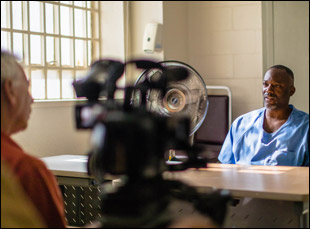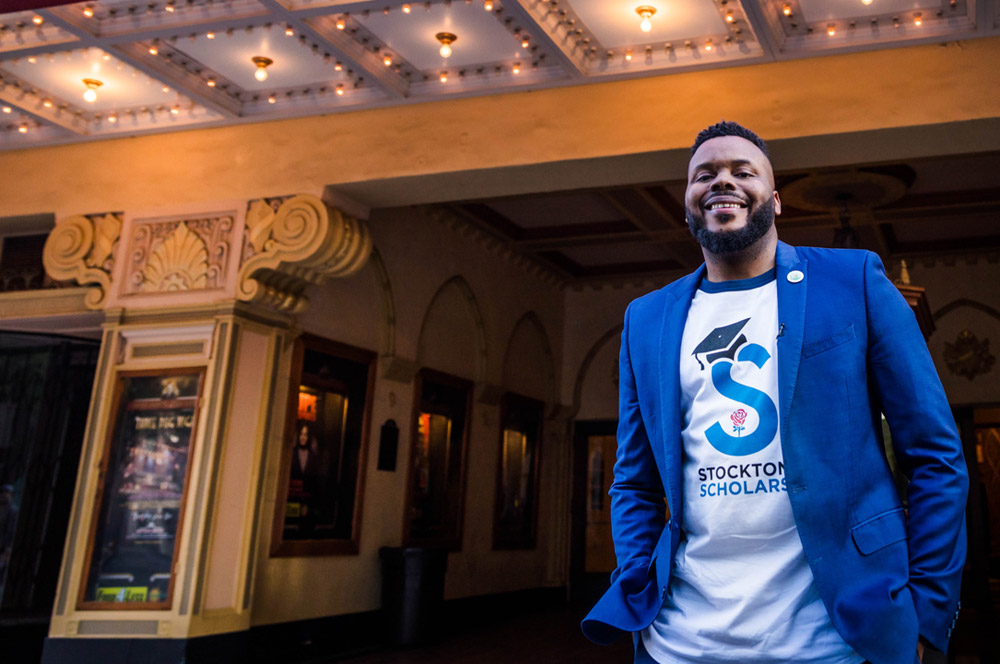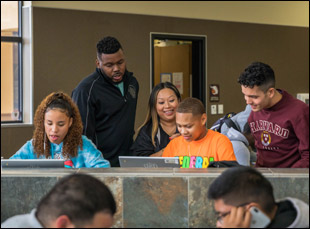Marc Levin can laugh about it now, but there was a time when finding the right premiere date for his latest film “Stockton on My Mind” was a complicated proposition, hoping that his time chronicling Mayor Michael Tubbs’ turnaround of the small Northern California city that was making its way out of bankruptcy wouldn’t be overshadowed.
“HBO was very supportive, but they’re like what are we going to do in the spring and then summer of 2020,” recalls Levin of the conversations happening as he was putting finishing touches on the film. “‘You know, we’re going to have the Democratic presidential primary battle going on and then we’re going to have the Olympics and then we’re going to have the conventions and then the election campaign. How are we ever going to fit Stockton in? Who’s going to pay attention?”
Even if the calendar hadn’t cleared out as a result of COVID-19 including the physical premiere that “Stockton on My Mind” was set to have at the Tribeca Film Festival, all eyes should be on Stockton at a time when merely competent leadership in government can be appreciated, let alone innovation, and there’s momentum to completely rethink how society should operate in the wake of inequalities laid bare by the pandemic and the murder of George Floyd. Levin already had cameras rolling when these conversations started happening in Stockton after the city elected the 26-year-old city councilman to be the first African-American mayor in its history, reimagining the community that had long been divided along racial lines with public programs such as guaranteed income and Stockton Scholars, a grant (with seed money from Tubbs’ Stanford classmate and Snapchat founder Evan Spiegel) to help underprivileged students from the area afford college.
Levin, who has been around such rebuilds before in covering Cory Booker taking charge of Newark, which had been felled by decades of corruption, in “Brick City” and Rahm Emanuel’s stewardship of the Windy City in “Chicagoland,” is able to capture not only how much change Tubbs and his administration is putting into motion, but the history that they’re up against, looking no further than Tubbs’ father Michael Tubbs Sr., who ended up in prison like so many other young men of color in the community did from charges relating to drug abuse and sees no opportunity to show how he’s reformed when he was given a life sentence. The film follows Tubbs Jr. as he dashes around the city identifying all its systemic issues in order to address them, and Levin spends the time to show how interconnected they are and gives them a human face, illustrating the way in which so many feel their destiny is predetermined when a lack of opportunity has led to crime and teen pregnancy that has stifled generations from reaching their potential.
Like its central subject, “Stockton on My Mind” spends more time looking forward than looking back, becoming an energizing portrait of a city in transition and an exciting politician on the rise whose chief preoccupation is lifting his community up, the kind of hopeful documentary that ultimately makes its debut on July 28th perfect timing in this most heated of summers (a fact acknowledged by execs at HBO, which will be making the film available to all next week on HBO.com after its initial airing on the network.) On the eve of the film’s premiere, Levin spoke about how Mayor Tubbs opened up his city and his life to show the power of institutions to change people’s lives for the better when they put their power into changing them if they no longer work.
Originally, I went to Stockton a while ago because it was ground zero for the subprime mortgage meltdown in 2007 and 2008. I’d done a series of movies for HBO, starting with “Schmatta: Rags to Riches to Rags” to “Lost in Long Island” and then “Class Divide,” [these films] about how these great economic forces were impacting every day people’s lives, and when I went to Stockton, I met this 22-year-old city councilman Michael Tubbs Jr. and I remember talking to him and he said, “Oh, Oprah Winfrey contributed to me and supported my campaign and she’s only supported two other politicians in her life – Cory Booker and Barack Obama.” And I said, “Whoa, that’s pretty good company” – of course, I had done “Brick City” in Newark with Cory for two years and I was actually just finishing “Chicagoland” in Chicago, Obama’s home, so I thought this kid is someone to watch. Then in 2016, the day that Donald Trump got elected president, Michael Tubbs got elected mayor at 26 years old, becoming the younger mayor of a major U.S. city and I thought, “Wow, all eyes on Washington, obviously, but on the local level, and in a place like Stockton, things are going in a totally different direction,” and I was really curious to follow that and interested in people that were trying to make change on a ground level.
After telling the stories of cities in transition in “Brick City” and “Chicagoland,” which were both series, did it make sense immediately to do more focused on Michael Tubbs versus something more disperse around the city?
That’s a very good question because with Michael, he’s an incredibly attractive, intelligent leader, but he’s not the kind of electrifying public speaker that Cory Booker is. He’s more thoughtful and introspective, so I was torn. There were two things happening. One, could I get inside his mind? He was so young and [I wondered] could I also get inside his personal life in a way I hadn’t really done with either Cory or Rahm Emanuel, and then this is to Michael’s credit, a lot of politicians, even progressive politicians, are like, “Why is the camera pointing over there? I’m here.” But Michael was the total opposite and he was part of a network of millennials that were all involved in making change and organizing and activism on the school board, so he was very generous in his attitude [of] “let the film be bigger than me.” He wanted people to understand that it takes a whole community to get involved, so that opened up a lot of possibilities.
What really determined ultimately where the film would land is his father, and if you know my work from “Gang War” to “Freeway Rick,” I’ve been there on the street [to show] the war at home – the drug war – so I was intrigued that his father was a Blood gang leader and was in the state prison. Michael didn’t really encourage me to seek out his father, which is understandable [when] he was concerned obviously that people in politics can use it against you, but again to his credit [he accepted it] when I told him, “Look, I get it,” but [asked] if I could reach out on my own to establish a dialogue because the whole father/son relationship becomes a subtext, in terms of breaking this cycle of generational poverty, of the school to prison pipeline, and of dysfunctional families where fathers are missing. Once I was able to meet with his father and through some negotiations get access to be able to bring a crew to get inside a California state prison – and his father is so charismatic and articulate and no one had really heard from him in the public – that was really where the decision was made to let’s structure this around his personal story with his policy and political story, [because] he had this universal basic income program that was just starting and then this scholarship program for any kids that graduated high school to go to a state school and then this controversial and innovative anti-gun and gang violence group Advance Peace. Those were all important, but they don’t really come to life [in a film] unless you’ve got an emotional connection to why these policies really mean something.

Once we made the decision on the personal level, the question was do you think we could find anybody now, a generation later that’s in high school like [Michael’s] mom was and is pregnant, or has a kid, and is trying to decide if they’ll graduate or go to college? Because that was one of Michael’s great regrets and even feelings of guilt was because of everything [he felt] his mother had to sacrifice for him – she did graduate high school, but she never went to college and he always felt bad about that. Then on the other side, are there any young men that have great potential, that are trying to do the right thing and yet are carrying some of the street life that they led and some of the troubles they are facing with the criminal justice system. I still find it miraculous that Joy and Isiah appeared, but I have to say, we [asked Michael], “Where can we go look? Where do you think we’d be able to find characters like this that maybe mirror where your parents were a generation ago?” And he said, “You should go talk to Brian Biedermann over at Edison High School” – he’s now the superintendent of schools.
We happened to go over there the day of homecoming, so we just got swept up into everything that was happening there. We just went with the flow and the flow ultimately led us to Isiah, who played in that football game, and to Joy, though that was kind of a sideway route. When they crowned the homecoming king and queen, we thought the homecoming king was going to be Junior, a Mexican-American who is also in the film and was taking pictures on the sideline of the football game as a photographer, but no, [the king] went to a woman, which totally blew our mind – Kendra won homecoming king and we were like “What? This is Stockton, California. They just elected a woman as homecoming king!” So we got to know her a little and she led us to Joy.
I still find it remarkable that we were able to find two characters, and in Isaiah’s case, it was just spooky because we met him and he was being mentored by Lavelle Hopkins, an ex-NFL football player and was on the right track and then all of a sudden, he had been [taken in] and when we went to the courtroom and heard the charges, the crime that came back to haunt him that happened two years earlier was so similar to the crime that put Michael Tubbs Sr. away for life Michael told us, “My goodness, it’s the same D.A.’s office that put my father away,” so you’ve got to watch the film to see where that lands, but that was incredible.
You also recently directed “I Promise,” a series for Quibi about the I Promise elementary school in Akron, Ohio that’s supported by the LeBron James Family Foundation. As someone who has covered government across a few generations, what’s it been like to witness these new ideas about community leadership?
It’s funny you mention “I Promise” because at one point, I was commuting from Akron and the third and fourth graders that were at the I Promise school who I became so close to, and then hanging out with the seniors at Edison High in Stockton, and of course, with the current administration, I just kept thinking, “Wow, you watch the news and the direction our country is going in is frightening,” yet what I’m seeing on the ground in two very different communities that have struggled is encouraging [with] a new generation coming of age, some very young, as in the I Promise school and some just about to step out of high school and hopefully go to college and go on from there. The leadership in both of these [communities] – LeBron is only 34 and Maverick [Carter], his partner and Michael [Tubbs] and his whole group, I felt at times when I was in their small little office there that I was in a college dorm, and it was like, “Are they really running a city of 300,000-plus people?”
But this diverse group of men and women coming up with these new ideas was very inspiring at a time when I was desperate for believing there are alternatives. There are seeds being planted, that take us in a totally different direction than the direction we set out nationally in the White House on November 2016, so I think in a way it kept me sane. At a time when so many people are desperate for change and demanding change, here is an opportunity to look at what change looks like and how you plant the seeds for what I would call a whole new social contract, which I think is what people are longing for. This gives you a first look at how that starts on the ground in Stockton, California, and going back to where Michael started, I would say the mantra is upset the set-up.
“Stockton on My Mind” airs on HBO on July 28th at 9 pm PST and will be available on HBO Go and Now.





